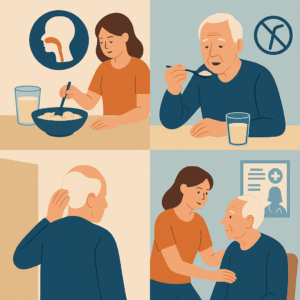Technology
How to Safely Care for Someone with a Swallowing Disorder

Why do people with swallowing problems need special care? Eating and drinking can be dangerous for them. For instance, foods or drinks can cause choking or find their way into the windpipe, which can be life-threatening. Swallowing difficulties can also lead to infections or fear and stress during meals.
Therefore, people affected should seek treatment and eat soft foods to stay safe and enjoy their meals. Besides, they should identify the best foods and eating practices to follow with their loved ones or caregivers to minimize the risk of aspiration pneumonia or choking.
Caregivers and family members who want to care for people with swallowing difficulties should learn how to do it safely. These simple tips can help enhance safety and reduce swallowing difficulties.
Prepare the Appropriate Foods
Many families get scared when their loved one cannot eat regular food. They worry that the person will get weak or sick. So, they try to feed them regular meals without knowing they might cause more harm to the patient.
Caregivers should always seek advice from doctors or speech therapists about feeding someone with swallowing difficulties, especially older adults. These experts know healthy and nutritious foods and how to prepare them to reduce the risk of choking or discomfort. So, they can offer effective and practical advice to promote safety.
Thickening food can help improve texture and consistency, reducing the risk of aspiration or choking. Therefore, doctors may recommend adding thickeners to liquids to improve swallowing. However, you should ask for help thickening your food to avoid making mistakes.
Seasoned caregivers and medical professionals can recommend the best thickeners and advise using the products. They may also recommend easy-to-mix thickening powders or ready foods that someone with a swallowing problem can eat.
Know the Right Products and Tools to Use
Some things may seem helpful, but are unsafe for people with swallowing disorders. For instance, straws can be dangerous because they make the liquid move too fast, increasing choking risks.
So, caregivers should identify things that could increase the risk of choking. They should also seek advice from seasoned caregivers or healthcare professionals before introducing new products or tools. This ensures food products or tools used to care for people with swallowing disorders do not worsen their condition or cause complications.
Respect Privacy
People with swallowing problems often feel embarrassed. Some may feel shy or worried when eating in front of others. It helps to give them some privacy and makes them feel more comfortable. Eating can also be stressful for them, especially if they do not want visitors to discover their problem.
People with swallowing disorders might sometimes feel tired or afraid. So, caregivers should never rush or force them to finish food quickly. Instead, they should let them eat slowly, allow them to choose their meals, and be patient with them.
Professional Help
Families care for loved ones with swallowing problems at home with the correct information. But some situations are too difficult to manage alone. When caregivers experience challenges, it is okay to ask for help from a doctor, nurse, or speech therapist.
These professionals understand the disorder better and can provide appropriate tools, medication, or advice to solve the problem. Caregivers can also join support groups. Talking to others with similar experiences can help them learn helpful coping strategies.
Swallowing problems can lead to serious health consequences. If someone with a swallowing disorder does not get proper care, they risk choking, infections, starvation, and low immunity, all of which can be life-threatening. That is why caregivers must learn how to care for them safely.














